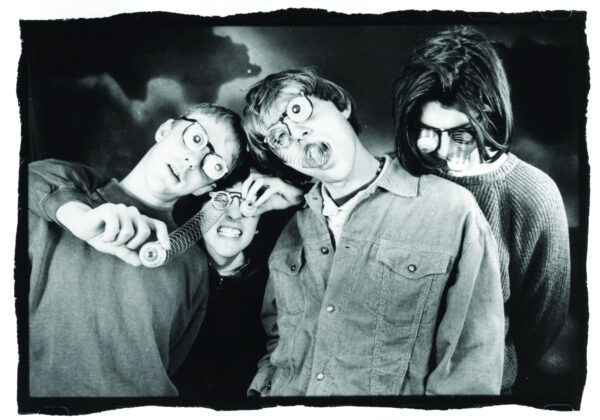Joe Jackson: My Profound Love Of Music Hall
The versatile New Wave, jazz, and classical musician, singer and songwriter, tells us why he loves this decidedly British tradition and muses on its influence on modern music.
By Joe Jackson
October 8 2024
Music Hall — the songs and laughter of the Victorian and Edwardian eras — was the first form of mass entertainment created by the working class. A decidedly British phenomenon, it has a cousin in American vaudeville, but no equivalent in Europe or anywhere else. It was our first pop music, and even after America conquered pretty much everything, its influence was there in Opposite: Little Tich (Harry Relph) performing his hit ‘Big Boot Dance’ (c. 1900). Right: Joe Jackson on tour with his new Music Hall album The Beatles and Kinks, Ian Dury, Madness, Blur, and others. It’s still there today, if you’re looking. It’s part of our DNA. For me, working on the album What A Racket! — a revival of the mostly forgotten songs of Max Champion, the Edwardian maverick — was the culmination of an interest in Music Hall that goes back to my earliest gigs, in my teens, playing piano in pubs. It’s an interest not everyone shares. Alexei Sayle probably spoke for many when he said, “People are always going on about the great British Music Hall, and why it died out. Well, I’ll tell you why it died out: ‘cos it was crap!’” Alright, but let’s face it: a sizeable percentage of everything is crap. And it’s inevitable that old stuff can seem, well, dated. And some of this stuff was pretty corny. Then again, corny English humour is a rich tradition, and I wonder if it’s something you grow into, rather than out of. I remember, as a teenager, rolling my eyes at my mother’s gatherings withvarious sisters, nieces, and female friends, all laughing their heads off at the most idiotic nonsense. Later I understood: it didn’t matter that the jokes were rubbish. What mattered was that they were together, and having fun. I have friends who roll their eyes at me now, because I like to go to the panto at Christmas.

Anyway, you don’t always have to ‘make allowances’ for Music Hall. It’s remarkable how many of these songs are not just still remembered, but still clever, catchy, and funny. And really, is today’s music so much better? I’m sometimes asked to comment on the current pop music scene, and compare it to, say, the 1980s. How about instead, comparing it to the 1890s? There were several kinds of songs then that people just don’t write any more. First of all, they were, more often than not, funny or satirical. The titles alone are irresistible: ‘A Little of What You Fancy Does You Good’; ‘Ain’t It Grand To Be Bloomin’ Well Dead’; ‘A Pair of Lovely Black Eyes’; ‘The Spaniard That Blighted My Life’. The lyrics Anyway, you don’t always have to ‘make allowances’ for Music Hall. It’s remarkable how many of these songs are not just still remembered, but still clever, catchy, and funny. And really, is today’s music so much better? I’m sometimes asked to comment on the current pop music scene, and compare it to, say, the 1980s. How about instead, comparing it to the 1890s? There were several kinds of songs then that people just don’t write any more. First of all, they were, more often than not, funny or satirical. The titles alone are irresistible: ‘A Little of What You Fancy Does You Good’; ‘Ain’t It Grand To Be Bloomin’ Well Dead’; ‘A Pair of Lovely Black Eyes’; ‘The Spaniard That Blighted My Life’. The lyrics
In 1900, Vesta Tilley — an elegant woman who performed dressed as a man — had a hit with ‘Burlington Bertie’, a song about an aristocratic idler. Some years later, another ‘drag king’, Ella Shields, followed up with ‘Burlington Bertie from Bow’, a character who “saunters along like a toff”, and “walks down the Strand with his gloves on his hand / and walks back again with ‘em off”. With lines like “been hungry so long, I’ve forgot where my face is”, we gradually realise he is in fact a tramp. This song is of a sub-genre called the ‘answer song’, in which one songwriter writes a response to another. Oddly enough, Music Hall has parallels with Hip Hop, which can also have outrageous (albeit less humorous) word play, and ‘answer songs’ (even if the answers are death threats). And, like Hip Hop, Music Hall produced larger-than-life characters: the absurdly elegant George Leybourne, aka Champagne Charlie; the bawdy Marie Lloyd; the raucous Harry Champion; and the frankly bizarre Little Tich. One of my favourites is Gus Elen, who dressed as a costermonger and sang songs such as ‘If It Wasn’t For The ‘Ouses In Between’. Like Bertie the tramp, Gus tries to ‘big himself up’, in this case by boasting of his lovely house and garden, where “You could see the ‘Ackney Marshes / Wiv a ladder and some glasses / If it wasn’t for the ‘ouses in between”. I’m reminded of the estate agent in my hometown, Portsmouth, recently trying to sell a house with “sea glimpses”
“Like Hip Hop, Music Hall produced larger-than-life characters”
Then there were sentimental songs — or to look at it another way, songs of true, heart-on-the-sleeve, sentiment. I used to think ‘Dear Old Dutch’ was the sappiest thing ever written. But taken on its own terms, it’s a beautiful song: a man telling us how much he still loves his wife after forty years of marriage. She’s his best Dutch plate (mate). Who would write a song like that now? There were also patriotic songs, which we definitely don’t do now. These days, patriotism is seen by many as one step away from fascism. Isn’t that a bit of a shame, though? Is it so terrible to value, and actually like, your own country — as an extension of your community, and your family — the people you love not because they’re objectively the best in the world, but because they’re yours?

Finally, many Music Hall songs have something else that is in short supply these days, namely glorious melodies. I was banging out some tunes on the piano at a house party a few years ago, when everyone started to sing along: “Daisy, Daisy, give me your answer do!” I was amazed; some of the crowd seemed much too cool to be singing this corny old crap. I asked one young woman how she knew the song; she had no idea. It’s in our DNA. Everything’s been done, and sometimes you have to go back to go forward. It would be nice to come across a young artist with real character, and songs with wit, humour, generosity (patriotic or not), heartfelt sentiment, and great tunes. Any takers?
Joe Jackson’s latest album, Mr. Joe Jackson Presents Max Champion in ‘What a Racket!’ is out now
